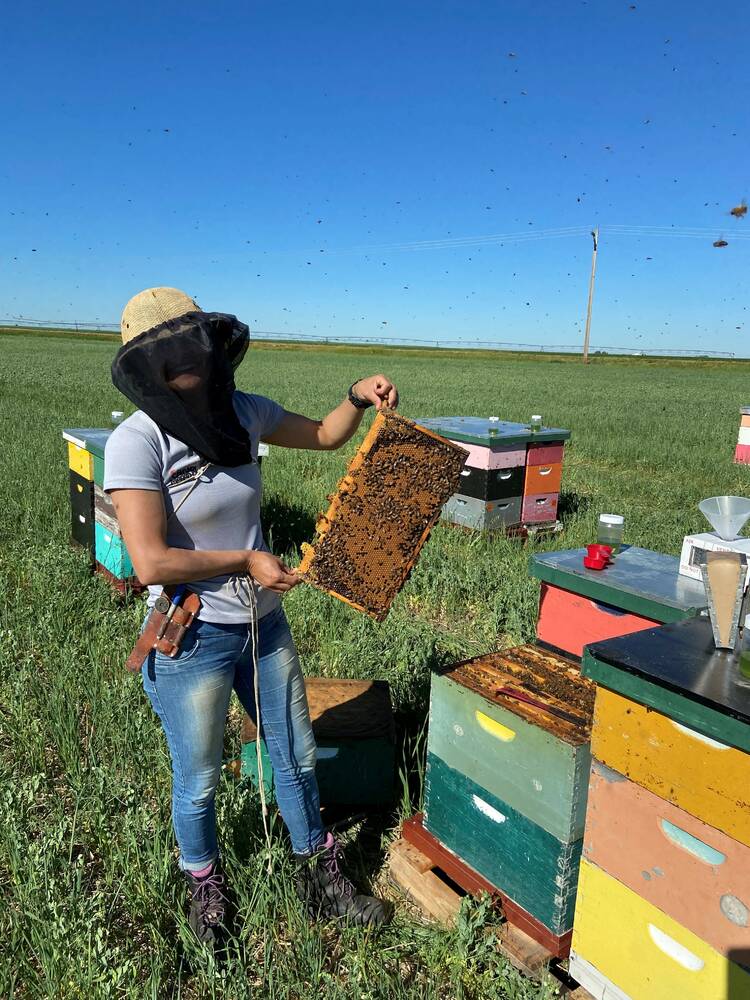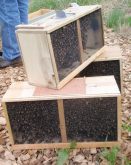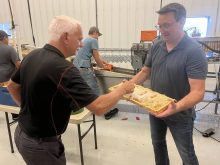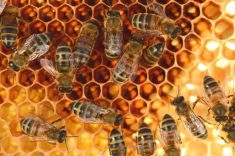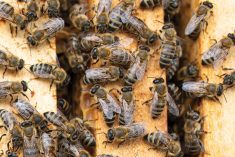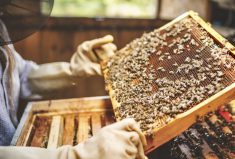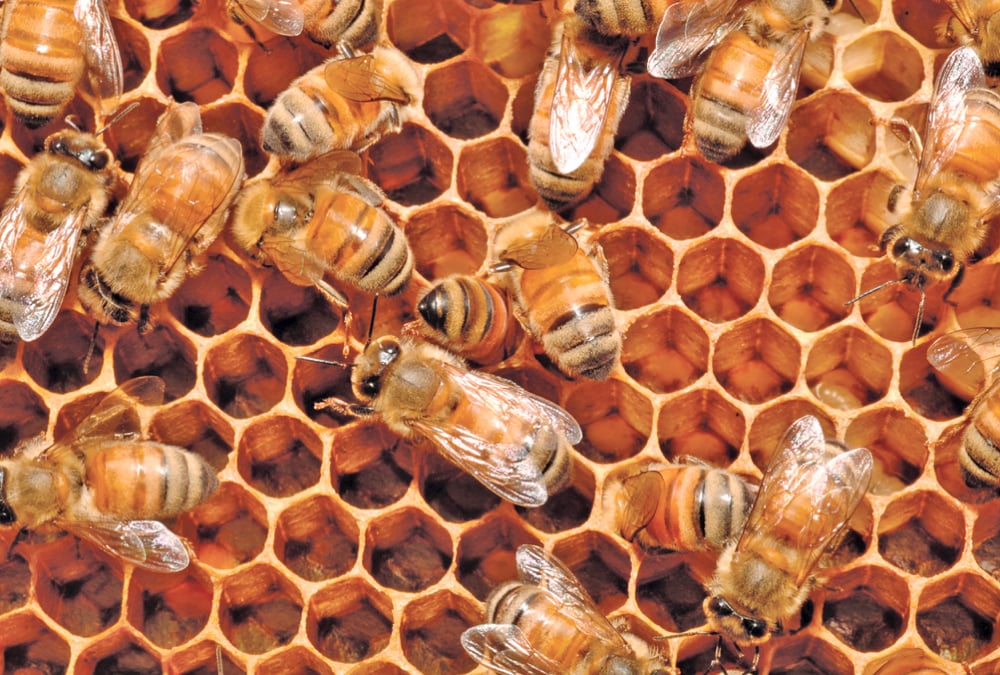Albertan honeybees play an important role in agriculture and economics locally, nationally and globally.
In 2024, the Alberta Beekeepers Commission had 160 commercial producers, said Renata Labuschagne, tech transfer program lead with ABC.
“To be an eligible producer, a beekeeper needs to have 100 or more colonies,” Labuschagne said during a webinar hosted by Adrienne Herron with the Alberta Agrisystems Living Lab.
Read Also
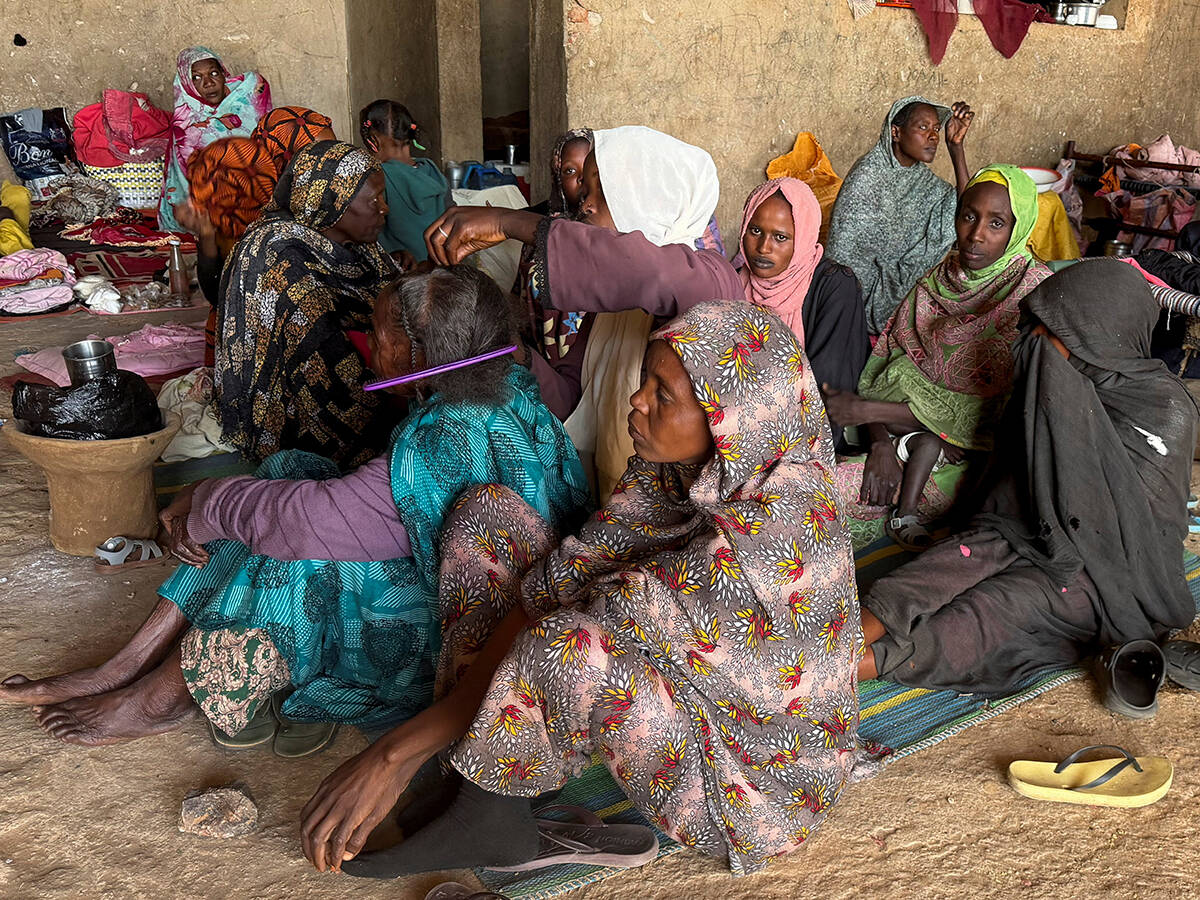
‘Millions will die’: Foodgrains Bank faces $2.7B federal funding threat
Foodgrains Bank warns $2.7B aid cut triggers a humanitarian crisis, risking global hunger relief and 40 per cent of its funding.
About 319,243 colonies were registered with ABC in 2024. In 2023, Alberta produced 37 million pounds of honey, which equals 40 per cent of all honey produced in Canada.
A great deal of revenue also comes from beekeepers who do contract pollination.
“On average, 75,000 colonies go into hybrid seed production annually. Contract pollination by our Alberta honeybees is valued at about $5 billion in additional harvest value,” Labuschagne said.
Honey exports bring in a significant amount of revenue.
“The United States is the largest export market at just over 50 per cent, and the second is Japan,” she said.
The three strategic priorities for ABC are honeybee health, market position and profile of Alberta honey, she said.
Honeybee health is the number one issue affecting the beekeeping industry.
“Overwinter losses for the past 10 years have averaged about 28 per cent. That is high,” she said.

These losses cost the industry an average of $25.2 million annually. To compensate for these losses, beekeepers must buy new packages of bees or split colonies to produce more bees.
“Since 2017, production of honey has been declining because of the increased mortality overwintering losses. In 2020, 2021 and 2022, overwintering losses were extremely high, the highest in the last few years,” said Labuschagne.
“In some regions, beekeepers lost about an average of 60 per cent of their bees,” she said.
The number one threat to honeybee health is the varroa mite, which is like a tick for honeybees. Beekeepers must also deal with climate change, as well as weather and climate in general.
Some years are extremely hot, wet or dry, and these factors impact honeybee health. Poor nutrition is associated with climate, while pesticides can affect honeybee health.
“The other issue impacting the industry is evolving market demands. There’s been an increase of pesticides in honey, and this is changing the maximum residue limits of some countries. They are requesting a change in the maximum residue limits, and that impacts beekeepers because they must deal with that. Japan is one of the countries that has changed maximum residue limits and now beekeepers must try to achieve that, as well as a myriad of sustainability goals from different buyers.
Canada also has issues around seasonal labour.
“Most Albertan beekeepers rely a lot on seasonal workers that come from many different countries, and they have a driver’s licence from their countries,” she said.
Commercial insurers have changed their practices and now refuse to provide vehicle insurance to workers that come from overseas.
“Many times, the beekeepers are unable to get insurance for those seasonal workers so they can drive the vehicles,” said Labuschagne.
There’s also a mixed ability to obtain Alberta Health cards for seasonal worker, she said.
Labuschagne is involved with the Alberta tech transfer program at ABC.
The tech transfer program focusses on education, extension and research.
The education portion involves putting on workshops, webinars, courses and on-farm training for beekeepers.
“We provide educational programs to transfer that knowledge to bridge that gap from science to practice in the field,” she said. The team also teaches integrated pest management on producers’ farms.
For research, the key focuses are hive health, pollination and ensuring Alberta honey is viewed by consumers and industry as safe, pure and healthy. ABC collaborates on bee research projects with Olav Rueppell, a professor in the Faculty of Sciences-Biological Sciences at the University of Alberta, as well as Shelley Hoover from the University of Lethbridge, and Steve Pernal, a bee researcher from Agriculture and Agri-Food Canada, stationed at Beaverlodge. The commission is also involved in applied research with the government of Alberta. The extension side is the one area where ABC is very active.
“We create and deliver extensions services, resources that address major trends, issues and knowledge gaps related to beekeeping in Alberta. Our main extension project is called the colony health monitoring service. This is a disease monitoring service that we do across the province. We work with the Alberta beekeepers and we go visit their operations and we sample their colonies three times a year if they’re pollinators, twice if they’re non-pollinators,” she said.

ABC also samples for diseases, pathogens, and viruses. For years, they have carried on the mite monitoring campaign, encouraging beekeepers to monitor and look for mites in their colonies.
The Alberta Beekeepers are joining the Pollinator Corridor Initiative, a project which started in the U.S. Alberta beekeepers have put on a resolution to join this initiative, because the province has many kilometres of paved and unpaved roads, where people could plant flowers that would attract bees, while improving the health of the environment, bees, crops and livestock.
The Alberta Beekeepers wants to work with the Ministry of Alberta Agriculture and Irrigation and the Ministry of Transportation and Economic Corridors, to develop a strategy for pollinators, assessing Alberta’s public space and roadways, said Labuschagne.
“Other countries have done similar initiatives to use the roadway as a nice place for pollinators to feed on. In the United States, they have roadside best management practices for managers and decision makers,” she said.


